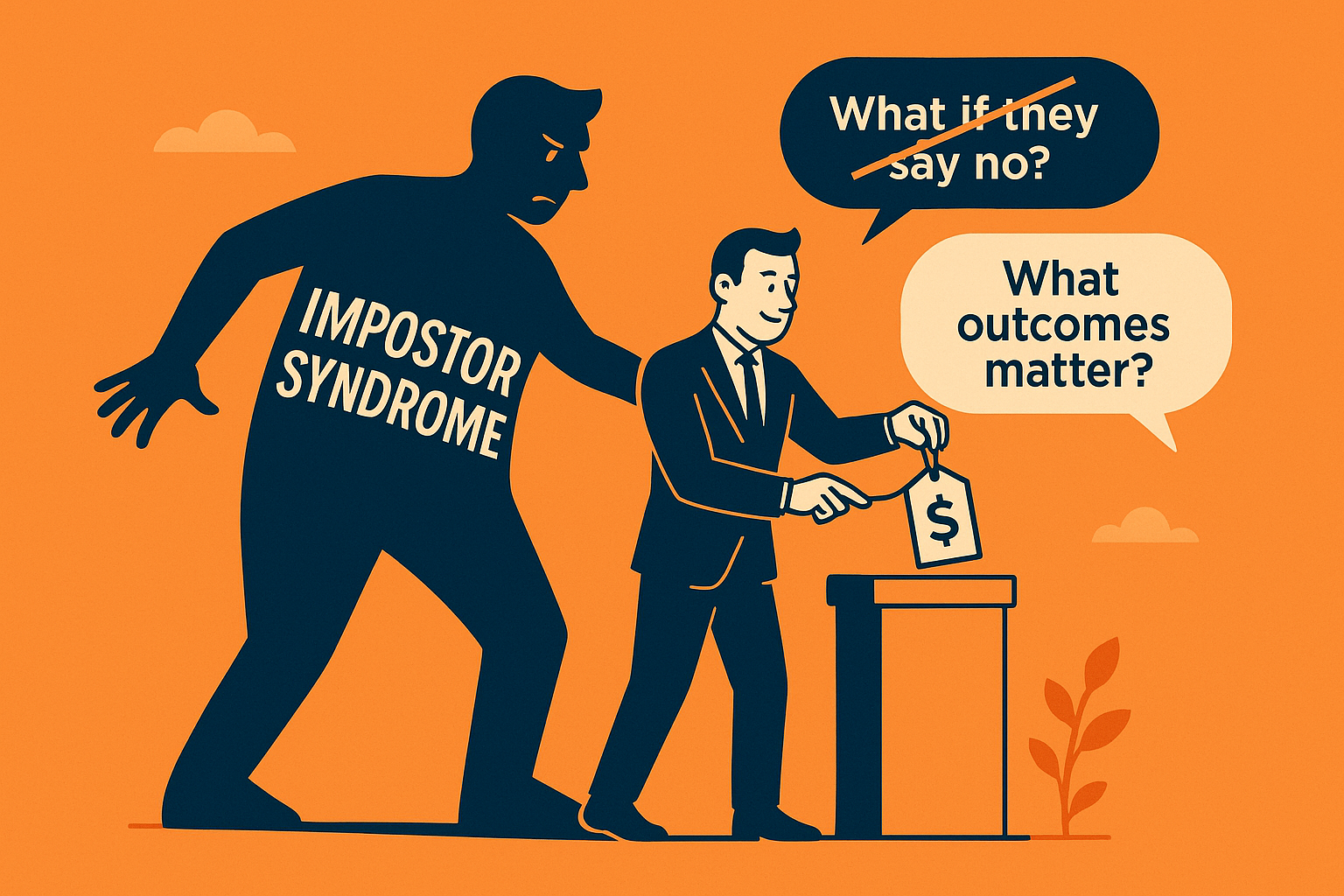"Our proven process"
We had those words front and center on our website. We had them in our capabilities deck. I stated them proudly during discovery calls with prospective clients. I was proud of it - proud of the results we had been able to deliver to clients based on this "proven process."
They didn't care though. Our existing clients didn't care about the process, and the prospective clients most definitely didn't give two shits about it.
This was early days of my first agency, and in response to this "proven process" pitch, I would consistently get blank stares at best—skeptical ones at worst. If we were honest with ourselves back then, our "proprietary proven process" was virtually identical to that of every single other agency, even though we changed the wording and definitions slightly.

Just looking at this slide makes me cringe.
DMOAG - ok we didn't go with the clever trademarked acronym, but we did talk about trying to do that. 🤦♂️
But that doesn't change the fact that this "proven process" was completely worthless as a marketing and business development asset.
The Lure of the Trademarked Acronym
Every firm has their "4D Model" or their "Xcelerate Framework" or some other clever acronym, or a set of synonyms that when reverse engineered sound exactly like our DMOAG 5 step proces. Many boutique firm founders believe that branding a methodology is the key to differentiation. And for those who have followed me for a while, you might be thinking... but wait Mike, don't you advocate for firms to build out and codify their IP as their main differentiator?
Yes, but if you are asking that question, I urge you to go back and read some of my past articles and really focus on the nuance.
Here is the hard truth, that if you are really honest with yourself, you will inevitably agree with—clients don't hire you for your process. They hire you for your ability to solve their problems and deliver their desired outcomes.
That means that your "proven process" is only as good as it is in delivering those outcomes. And even when it does deliver those outcomes consistently, the process isn't a selling point or differentiator. Clients expect you to have a process. They hire consultants because of their expertise, which generally includes a proven way of thinking about and doing things.
Your Clients Aren't Stupid
Your clever acronym process might feel tangible, and it will create the illusion of intellectual property, but if you know that at its core it's barely different from what other firms do, then I can guarantee you your clients will know it to. Even though it's not what what you are trying to do, your clients will feel like you are trying to pull one over on them, and when they feel that way, they will inevitably become skeptical of what else you may be being disingenuous about.
They will inevitably become a more risky bet for them, which is the opposite of what you set out to do with this effort.
The Myth of the Proprietary Process
Naming something doesn't make it meaningful or valuable. And even though you may think that you are mimicking what the big firms do, you need to realize that there is a major difference between coming up with clever naming and phraseology and spending insane resources on proprietary research that creates real insights. The latter is what the big firms do.
Without the rigorous research and insights, all you have is veneer.
Process vs. Frameworks vs. Methodologies
The reason nobody cares about your "proven process" is that it only addresses the HOW - how do you execute step-by-step tasks consistently. But clients aren't buying tasks, nor your ability to execute them. They are buying the outcomes of those tasks. Yes, execution matters, but in consulting, what matters more is the thinking behind the execution. That's where frameworks and methodologies come into play.
A Framework is all about structured thinking. It's about concepts and models that help your ideal client think about, analyze, and diagnose their problem. A methodology is one step above that, with a focus on the WHY - why does this problem exist, and how you should think about it. It's a systematic, principled approach to thinking about and tackling a problem. A methodology will include both a framework and a process, and also a rationale.
The rationale is key. It those exploring the mothodology understand why thinking about the problem in this way makes sense, and is benefitial. It isn't a pitch for your firm's services. It is an exposition for your knowledge and expertise in this space, and the goal is to get your prospective client to think differently. The act of thinking differently will create a connection in their brain with the person/brand that got them to think differently.
That connection is incredibly powerful, and is the first step in de-risking the buying decision (i.e. why would they choose you over someone else).
Your process then, needs to exist fully in support of the overarching methodology and the underlying frameworks. That's what real intellectual property looks like.
Clarity and Outcomes
Consulting is all about change. You are being brought in to change something in your client's organization. Whether you are coming in as a tactical resource to implement a specific part of the change, or as a strategic resource to help them think about and plan for the change - change is what you are consulting on.
Clients want clarity about why change is needed, what impact it will have, and advice on how to deal with it. The don't need clarity on how you'll do it - save those details for the SOW.
Clients also want the outcomes of the change. Nobody undertakes change just for the sake of it. They do it because the outcomes on the other side of that change - the promised land - are desirable. Your "proven process" does nothing to bring clarity, nor to explain what the outcomes will be. The number of steps doesn't matter, and neither does their sequence. The outcome matters.
Your process only matters in the context of the methodology and associated frameworks.
When IP Matters
Methodologies and Frameworks are useful internally for consistency and externally for clarity. The objective is to make the complex simple. Your internal teams are more aligned on how to think about the problem, and your clients get the benefit of reframing and simplifying a problem that to them is difficult to grasp.
Processes are useful internally to insure consistent execution and externally to ensure that your clients get the value they were promised.
Codify Your IP Without Fluff
Storytelling is a critical skill, and it's extremely valuable when presenting your methodology to prospective clients. But that doesn't mean that you need fluff and theater. You don't need buzzwords and trademarked acronyms. You don't need fancy presentations and complex visuals.
You need to identify the key insights, package them up into concrete ways of thinking, and present that in a way that makes your ideal clients' face light up.
Just about every consulting firm has IP, but many don't know how to extract, synthesize, and package it up for promotion.
Here are a few prompts to get you thinking about what your firm's IP is:
- What are the "aha moments" that your prospective clients have during business development conversations?
- What are the "aha moments" that your ideal clients have when reviewing your deliverables?
- What are the "aha moments" that your ideal clients have during the delivery process?
If you already have your IP created, ask yourself whether it's clarifying your value or obscuring it with complexity.
Want to turn your IP into a true growth engine? Let’s talk about how to clarify, codify, and commercialize it, without the fluff.



.png)



